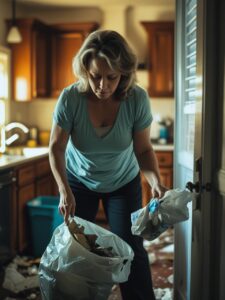You know that feeling when someone walks all over you? I do. My name’s Diana, and for three long months, I lived like a maid in my own home, treated like background noise by my adult stepdaughter, Kayla. She dumped trash wherever she pleased, acted like I existed to serve her, and assumed my patience was endless.
She was wrong.
My husband Tom and I had built a beautiful life together over ten years. Our home on Redwood Lane was cozy, filled with laughter, crossword puzzles, and Sunday pancakes. My son from my first marriage, Rick, was thriving in college. And Kayla, Tom’s 22-year-old daughter? Well, she hovered at the edges, mostly indifferent toward me. Not cruel. Just distant.
I tried everything. Birthday cards. Girls’ nights invitations. Gentle conversations about her future. Nothing seemed to reach her. But when she called Tom one rainy evening, crying and asking to come home for “just a little while,” I opened my arms. Of course she could stay. Family, after all.
She arrived like a whirlwind with suitcases and shopping bags, barely nodding at me as she swept past and claimed the guest room I’d so carefully prepared for her. Within days, the warning signs appeared: cereal bowls abandoned, makeup wipes tossed around, empty water bottles multiplying like rabbits.
“Could you put these in recycling, sweetie?” I’d ask gently.
“Sure, whatever,” she’d mumble, never moving.
Her trail of mess only grew. Banana peels under couch cushions. Amazon boxes stacked in doorways. Food wrappers scattered like confetti. My home—once a sanctuary—was turning into a landfill.
“Give her time,” Tom said. “She’s just settling in.”
But weeks stretched into months. And the breaking point came one Sunday morning. After deep-cleaning the living room while Tom was out golfing, I stepped outside to pick tomatoes from the garden. I returned minutes later to find chaos: takeout bags, soda cans on the floor, orange Cheeto dust ground into my cream-colored rug.
And there sat Kayla, scrolling her phone like nothing was wrong. “Diana! Could you whip up some of those pancakes you made for my birthday? I’m starving.”
I stood there, looking at the destruction. My chest tight. My hands clenched.
“You know what?” I replied calmly. “I think I’m out of pancake mix. Order takeout.”
That night, as Tom snored beside me, I made my decision. If Kayla saw me as the maid, fine. But the maid was quitting.

The next morning, I stopped cleaning up after her. Every dirty dish stayed. Every wrapper remained. Every bit of mess was left exactly where she dropped it. Within days, the coffee table resembled a garbage dump.
By Tuesday, Kayla snapped.
“Diana?! You forgot to clean up in here!”
I poked my head around the corner. “Those aren’t my dishes.”
She blinked. “But… you always do it.”
“Do I? I don’t recall agreeing to that.”
By Thursday, I escalated. Every piece of trash with her fingerprints on it—used tissues, banana peels, candy wrappers—I neatly bagged, labeled, and delivered to her room. “Thought you might want these back!” I wrote on each note.
Her outrage built. But I remained polite.
The final blow came the next week. I packed her lunchbox with her own garbage—perfectly arranged like a twisted bento box: the moldy apple core, empty chip bags, even a used makeup wipe.
At lunchtime, my phone buzzed with furious texts: “WHAT THE HELL DIANA???” “Everyone at work thinks I’m insane!”
I calmly replied: “Thought you might enjoy leftovers. Have a great day!
That evening, Kayla came home strangely quiet. She glanced around the now spotless living room.
“Diana?” she called softly. “The living room looks nice.”
I smiled. “Thank you.”
She hesitated. “I cleaned up… upstairs too.”
“Thank you, Kayla.”
The next morning, every dish was washed. Laundry was folded. Trash bins emptied.And then, before she left for work, she paused at the door. “Diana? If I… ever want pancakes again, can I just ask nicely next time?”
I smiled. “That’s all I ever wanted.”
Two months have passed since the Great Lunchbox Incident of Redwood Lane. While we’re not best friends braiding each other’s hair, something far better blossomed: mutual respect.
We even made pancakes together last Sunday. She ate four and actually smiled.
Tom asked what changed. “What magic spell did you cast?” he whispered.
“No spell,” I said. “Sometimes people need to see the mess they’re making before they learn to clean it up.”
Some lessons require tough love. And sometimes, those of us who’ve quietly held it together for years finally find our voice.
If this story hit home, share it. You never know who needs the reminder: patience is a gift, but respect is earned.


